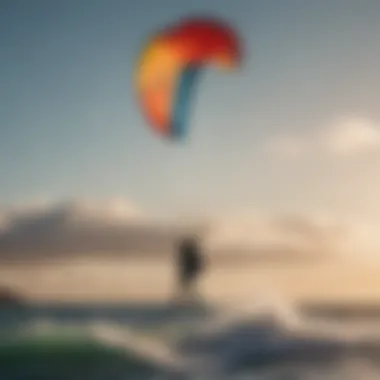Unleashing the Thrills of Kitesurfing: Mastering Your Kite Kit Essentials


Water Activity Overview
Prepare to plunge into the captivating realm of kitesurfing, a thrilling water sport that melds adrenaline with technical prowess. Unlike surfing where riders catch waves, kitesurfers utilize a large kite to harness the wind's power and skim the water's surface in a balletic display of skill and speed. This dynamic activity beckons water sports enthusiasts seeking an electrifying aquatic adventure on both calm lakes and tumultuous oceans.
Tips and Techniques
For novices venturing into the kitesurfing domain, mastering the basics is paramount. Understanding wind patterns, kite control, and body positioning lays a sturdy foundation for progression. As experience mounts, aficionados can delve into advanced techniques such as jumps, spins, and grabs that elevate their maneuvers to a jaw-dropping spectacle. Moreover, adhering to safety protocols, including proper equipment inspection and weather awareness, is non-negotiable to ensure a secure and enjoyable kitesurfing escapade.
Gear Reviews
The kitesurfing gear ensemble comprises an assortment of essential components that harmonize to elevate the riding experience. From inflatable kites engineered for optimal wind catchment to hydrodynamic boards that slice through the water with minimal resistance, each gear element plays a crucial role in the seamless execution of kitesurfing stunts. Wetsuits designed for insulation and flexibility, alongside harnesses engineered for comfort and control, complete the arsenal needed to conquer the windswept waves.
Destination Guides
Embark on a globetrotting voyage to discover premier kitesurfing havens that promise awe-inspiring vistas and bracing breezes. From renowned coastal resorts like Maui, Hawaii, and Tarifa, Spain, to hidden gems like Watamu, Kenya, and Parajuru, Brazil, a myriad of locales beckon kitesurfing enthusiasts. Travel-savvy tips, from luggage packing strategies to accommodation recommendations, pave the way for seamless water sports expeditions that blend thrill-seeking with cultural exploration.
Introduction to Kitesurfing
Kitesurfing, a thrilling water sport that combines the elements of wind and waves to propel riders across the water's surface, holds a magnetic appeal for adventure seekers and water sports enthusiasts alike. In this section, we embark on a journey to unravel the essence of kitesurfing, exploring its rich history, fundamental techniques, and crucial safety considerations. Whether you're a novice looking to dip your toes into this adrenaline-pumping sport or a seasoned pro seeking to enhance your skills, understanding the foundational aspects of kitesurfing is paramount to enjoying a safe and exhilarating experience.
History and Evolution of Kitesurfing
The Origins of Kitesurfing
Kitesurfing traces its origins back to the late 1970s when innovative watermen sought to harness the power of the wind for navigating the waves on surfboards. The marriage of kite flying and surfing gave birth to a revolutionary sport that challenged traditional notions of wave riding. The raw essence of freedom and adrenaline that kitesurfing offers propelled its popularity, attracting thrill-seekers worldwide to conquer the seas with nothing but a kite and board.
Technological Advancements in Kite Design
The evolution of kite design in kitesurfing has been nothing short of remarkable, with engineers and designers constantly pushing the boundaries of innovation. From the transition of simple parafoil kites to sophisticated inflatables equipped with high-performance features, technological advancements have revolutionized the sport's safety, efficiency, and performance. The fusion of cutting-edge materials, aerodynamic principles, and ergonomic designs has not only enhanced rider experience but also opened doors for greater creativity and style in maneuvering the kite across diverse wind conditions.
Fundamentals of Kitesurfing
Basic Techniques and Maneuvers


Mastering the basic techniques and maneuvers in kitesurfing sets the foundation for seamless progression and enjoyment on the water. From body dragging and water starts to effective board control and edging techniques, honing these fundamental skills is essential for safe and proficient riding. Understanding the intricate interplay between kite handling and board movements allows riders to navigate varying wind strengths and wave conditions with confidence and finesse, unlocking a world of endless possibilities for exploration and progression.
Understanding Wind Patterns
Wind patterns play a pivotal role in shaping the kitesurfing experience, influencing everything from kite selection to riding strategies on the water. Grasping the nuances of wind direction, speed, and gusts empowers riders to make informed decisions during their sessions, optimizing their performance and safety. Recognizing wind shifts, lulls, and accelerations enables kitesurfers to adapt their techniques accordingly, maximizing their time on the water while minimizing risks and enhancing overall enjoyment.
Essential Components of a Kite Kit
The crux of kitesurfing lies in the meticulous selection of the kite kit's elements. Each component plays a vital role in ensuring a safe and thrilling experience on the waves. From the intricate design of the kites to the stability of the boards and the protection offered by safety gear, every element is meticulously crafted to enhance the kitesurfer's performance and safety. Understanding the nuances of these essential components is crucial for both beginners looking to venture into the sport and seasoned riders aiming to elevate their skills to new heights.
Types of Kites
Leading Edge Inflatable (LEI) Kites
When delving into the realm of kitesurfing, the Leading Edge Inflatable (LEI) kites distinguish themselves as a top-tier choice for riders seeking stability and control in varying wind conditions. The key characteristic of LEI kites lies in their inflatable leading edge, which grants them unmatched performance and maneuverability on the water. This design feature enables swift and precise movements, crucial for executing complex tricks and maneuvers with finesse. Despite their popularity, LEI kites do come with a potential drawback - their setup can be more intricate compared to other kite types, requiring riders to be well-versed in proper handling techniques.
Foil Kites
On the opposite end of the spectrum, Foil kites offer a sleek and aerodynamic alternative for kitesurfers looking for efficiency and speed on the water. The standout feature of Foil kites is their lightweight construction, allowing for effortless gliding and superb performance in light wind conditions. This makes them a preferred choice for riders seeking extended airtime and graceful transitions between maneuvers. However, their design, which lacks rigid structures like struts, may pose challenges in relaunching from the water in turbulent conditions, requiring riders to master specific techniques for optimal performance.
Kiteboards and Their Varieties
Twintip Boards
When considering kiteboards, the versatility of Twintip boards shines through as an ideal option for riders focusing on freestyle tricks and aerial maneuvers. The key characteristic of Twintip boards lies in their bidirectional design, allowing riders to perform tricks seamlessly without needing to switch directions. This feature not only enhances the rider's agility on the water but also facilitates continuous movements, crucial for maintaining momentum during jumps and transitions. While Twintip boards excel in freestyle disciplines, they may pose limitations for riders exploring wave riding or directional movements, requiring riders to define their kitesurfing style before selecting the appropriate board.
Directional Boards
Contrasting Twintip boards, Directional boards cater to riders seeking an immersive wave riding experience and optimal performance in varying water conditions. The key characteristic of Directional boards lies in their asymmetrical design, tailored to harness the power of waves and deliver unmatched stability for riders navigating challenging surf breaks. This feature enables riders to carve through waves with precision and control, providing a dynamic and engaging kitesurfing experience. However, the directional nature of these boards may limit their versatility in performing freestyle tricks, necessitating riders to prioritize wave riding capabilities over maneuverability.
Crucial Safety Gear
Impact Vest


Among the essential safety gear for kitesurfing, the Impact Vest stands out as a crucial shield, offering protection against high-impact falls and collisions on the water. The key characteristic of Impact Vests lies in their ability to absorb and distribute impact forces evenly across the rider's torso, reducing the risk of injuries during challenging maneuvers or unexpected falls. This makes them a popular choice among riders seeking added confidence and security while pushing their limits on the waves. However, the bulkier design of Impact Vests may restrict some riders' movements, requiring them to strike a balance between safety and maneuverability based on their kitesurfing style and preferences.
Helmet and Safety Leash
Complementing the Impact Vest, Helmets and Safety Leashes serve as essential tools in ensuring the rider's safety and security during kitesurfing sessions. The key characteristic of Helmets lies in their robust construction, designed to protect the rider's head from potential impacts with water surfaces or rigging equipment. Additionally, Safety Leashes play a pivotal role in securing the kite to the rider, preventing runaway scenarios and ensuring immediate control in unpredictable situations. While these safety gear components offer unparalleled protection, riders must also consider factors like comfort and visibility, balancing safety requirements with their personal preferences to optimize their kitesurfing experience.
Selecting the Right Kite Kit
In the realm of kitesurfing, the significance of selecting the appropriate kite kit transcends mere preference; it's a critical decision that directly impacts your experience on the waves. The process of choosing the right kite kit involves meticulous consideration of various factors to ensure optimal performance and safety. From novice riders to expert enthusiasts, the selection of a kite kit tailored to individual needs significantly enhances the overall kitesurfing experience.
Factors to Consider
Skill Level and Riding Style
Skill level and riding style serve as foundational pillars in the realm of kitesurfing, dictating the type of kite kit best suited for each practitioner. Novices may benefit from kites that offer enhanced stability and ease of control, aiding in the learning process and reducing the learning curve. In contrast, seasoned riders inclined towards advanced maneuvers may opt for kits with greater responsiveness and agility, enabling them to push the boundaries of their skills. Understanding one's skill level and preferred riding style is crucial in aligning with the most suitable kite kit configuration for a fulfilling and rewarding kitesurfing session.
Wind Conditions
Wind conditions play a pivotal role in determining the ideal kite kit for a kitesurfing expedition. Factors such as wind speed, direction, and consistency directly influence the choice of kite size and type. In light wind environments, larger kites prove advantageous due to their enhanced power generation capabilities, ensuring sufficient lift for smooth rides. Conversely, strong gusty winds necessitate smaller, more maneuverable kites to maintain control and prevent overpowering. By carefully evaluating prevailing wind conditions, riders can navigate the waters with confidence, knowing they have selected a kite kit optimized for peak performance.
Expert Recommendations
Drawing insights from industry experts and experienced kitesurfing professionals can offer invaluable guidance in selecting the right kite kit. Top brands renowned for their innovation and quality craftsmanship provide riders with an array of options tailored to diverse preferences and skill levels. Identifying reputable brands known for durability and performance can instill confidence in the reliability of the chosen kite kit, ensuring long-term satisfaction and usability. Moreover, considering popular kite kit combinations endorsed by experts can simplify the decision-making process, offering tried and tested configurations that combine seamlessly for an enhanced kitesurfing experience.
Maintaining and Caring for Your Kite Kit
Maintaining and caring for your kite kit is crucial to ensure optimal performance and longevity. Neglecting upkeep can lead to safety hazards and decreased equipment lifespan. By prioritizing maintenance, you not only enhance the durability of your gear but also strive for a seamless kitesurfing experience. This section explores essential practices to keep your kite kit in top condition.
Cleaning and Storage Tips
Rinsing Off Saltwater Residue
Rinsing off saltwater residue is a fundamental step in preserving your kite kit. Saltwater can corrode materials over time, affecting kite performance and structural integrity. By thoroughly rinsing your gear with fresh water after each session, you mitigate the risk of salt damage, prolonging the life of your equipment. This simple yet effective task is a cornerstone of proper kite care in this article.


Proper Storage Techniques
Proper storage techniques play a pivotal role in maintaining your kite kit. Storing your equipment in a dry, well-ventilated area shields it from moisture and mold growth. By avoiding direct sunlight exposure and utilizing gear bags or racks, you safeguard your gear from physical damage and UV radiation. Implementing appropriate storage practices ensures that your kite kit remains pristine and ready for your next kitesurfing venture.
Repair and Maintenance Guidelines
Kitesurfing enthusiasts must be adept at handling repairs and maintenance to address wear and tear effectively. Regular inspections and proactive upkeep enhance equipment reliability and safety on the water. This section delves into key aspects of repair and maintenance, empowering kiters to tackle common issues efficiently.
Patching Small Tears
Patching small tears promptly is essential to prevent further damage to your kite. Utilizing repair kits and adhesive patches, you can swiftly mend minor tears and extend the lifespan of your canopy. By mastering patching techniques, you uphold the structural integrity of your kite and continue to enjoy uninterrupted kitesurfing sessions.
Inspecting Lines and Bar System
Inspecting lines and the bar system is paramount for optimal kitesurfing performance. Frayed lines or faulty components can jeopardize safety and control on the water. Regularly checking for wear, knots, and tangles enhances overall system reliability. By conducting thorough inspections before each session, you minimize the risk of equipment failure and ensure a safe and exhilarating kitesurfing experience.
Conclusion: Embark on Your Kitesurfing Journey
Kitesurfing, with its undeniable allure and adrenaline-inducing nature, epitomizes the perfect blend of thrill and skill. The conclusion segment of this comprehensive guide plays a pivotal role in encapsulating the essence of the kitesurfing journey. Enriched with insights and practical advice, this final section serves as the gateway to a world where wind, water, and expertise converge.
Delving into the intricacies of kitesurfing, the final thoughts encapsulate the sheer excitement and challenges that come with mastering this water sport. From navigating wind dynamics to executing daring maneuvers, the journey into kitesurfing is not merely about conquering waves but attaining a sense of harmony with nature and oneself.
Final Thoughts on Kitesurfing and Your Kite Kit
Embracing the Thrills of Kitesurfing
Embarking on the exhilarating journey of kitesurfing involves embracing the sheer adrenaline rush that comes with harnessing wind power to glide across waves. The essence of embracing the thrills lies in melding the elements of skill, focus, and courage while riding the waves with finesse.
Highlighting the aspect of adrenaline-fueled excitement, embracing the thrills of kitesurfing offers an unparalleled rush that ignites a sense of liberation and euphoria. However, it requires a balance of calculated risk-taking and technical proficiency to savor the thrill without compromising safety amidst the unpredictable elements.
Choosing to embrace the thrills of kitesurfing introduces enthusiasts to a world where challenges evolve into triumphs and moments of apprehension fuel a deep sense of accomplishment in navigating the vast expanse of the ocean.
Continual Learning and Improvement
In the realm of kitesurfing, continuous learning and improvement serve as the cornerstone of mastering this dynamic sport. The essence of continual learning lies in embracing challenges as opportunities for growth and honing skills to navigate diverse wind conditions and wave patterns.
Highlighting the aspect of progression and refinement, continual learning fosters a mindset of adaptability that empowers kitesurfers to evolve their techniques and strategies in response to the ever-changing marine environment.
Opting for continual learning and improvement nurtures a culture of resilience and perseverance, where setbacks morph into lessons and each session on the water offers a chance to refine abilities and broaden horizons within the realm of kitesurfing.















